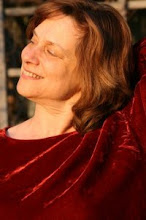It’s real. I’m speechless.
How convenient, then, that I happened to have talked to John Oakes, who, together with fellow publishing veteran Colin Robinson, has just launched OR Books—which seeks to combine the editorial professionalism of traditional publishing with a model that draws on new technologies for production, marketing, and delivery.
 John Oakes (in shades) with Colin Robinson (with the bullhorn) at the OR Books "launch party" during BEA. Photo by Miriam Berkley.
John Oakes (in shades) with Colin Robinson (with the bullhorn) at the OR Books "launch party" during BEA. Photo by Miriam Berkley.JDS: I’ve been reading about OR Books and admire your willingness to try something new. What keeps you in publishing at a time like this?
JO: What draws people to the book business is a sense of fun and wide-ranging interests. I have a restless mind—an English major also fascinated by science. The appeal of books remains. The world is too fascinating a place to be tied down to one thing.
JDS: Is there still fun to be had?
JO: The system of traditional publishing has gotten less fun over the last several decades. The decline in book-reading predates the Internet. Not reading per se but book reading. But now there’s electronic reading: still less than 1% of the reading public, but skyrocketing as people read on computers more and more. Print on Demand is part of an answer. There’s no upfront cash, production quality is now first rate, and the delivery system more streamlined.
JDS: One thing that interests me about POD-- haven’t explored electronic publishing—is the waste it cuts out.
JO: The traditional book system is hell on the environment. One little book is printed at the printer. Then shipped to the publisher’s warehouse. Then to the wholesaler or a major retail client. Then from wholesaler to the bookstore. If the book is among the 50% that are not sold, it goes back to the warehouse of the wholesaler then the warehouse of the publisher. Most likely, unless it’s made of Teflon, the book will be damaged and can’t be sold. This is bad for the publisher, the author, the bookstore—as the book had taken up shelf space—and bad for the planet. For that you’ve cut down a tree.
JDS: Yet most companies haven’t taken this to heart.
JO: The big guys are so entangled in the system it’s hard for them to extricate themselves. You’ve still got those high advances, publishers plunking down $1 million bucks for a first novel. It may be a good first novel, but they do that because they panic—they’re desperate for a hit and think this is the way to get it.
JDS: Where does OR Books fit in?
JO: Colin and I had been talking for a long time before we both, so to speak, found ourselves out on the street. We believe this shift is going to happen, that this is how publishing will look in the future. There’s still a need for professional editors and publishers to work with authors to shape a book and to market it. Some of the technicalities will change but the roles are the same. I don’t know that we will be, say, the Simon & Schuster of the 21st century, but someone will be.
JDS: Will authors balk if you’re not offering those mega-advances?
JO: I don’t think authors will be a problem. We’ve got books in the pipeline and are another round of drinks away from author deals with Dale Peck and a bunch of other name-brand authors tired of their experience with the traditional publishing system. We’re interested in progressive ideas but we look at that broadly. We will do contemporary fiction, edgy popular science, politics and memoir. It will be the independent publishing ideal of publishing what we love.




No comments:
Post a Comment